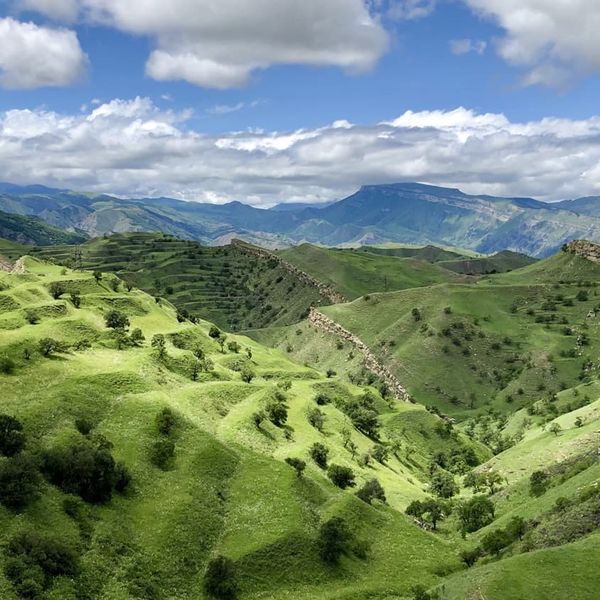
Back from Dagestan
This summer, I found myself planning a holiday to a little known part of Russia, tucked between the shores of the Caspian Sea and the majestic Caucasus Mountains: the republic of Dagestan.
How it all started
While Moscow and St Petersburg are quite popular destinations, Dagestan is a far less common one. It still has the reputation of being a dangerous area, thanks to the massive corruption, bomb attacks, and armed islamic militants that plagued it in the 1990's and early 2000. Given all of this, why did I decide to go?
Well, the missus grew up in Makhachkala before roaming the world for 14 years or so. She goes back regularly with her daughter to see her family. For me, on top of meeting her mom, dad, sisters and numerous cousins, it was an opportunity to visit Moscow and see the Caucasus Mountains, two places I always wanted to discover. My mom, who has been through a lot lately, was really keen on tagging along, which gave me another kick in the butt to make it happen.
So here we were, buying plane tickets, planning the trip, applying for visas and packing suitcases. My mom and I were feeling original and adventurous while others were simply going back home.
First stop: Moscow
I don't quite know why, but Moscow always felt to me like it was some remote place of the world. In reality, it's just a three hours flight from Brussels. Large streets, relatively low buildings and loads of trees and parks make the city feel clean, calm and spacious.
If you ever went to Berlin, that's what Moscow felt like to me: a rich history, apparent in the various layers of architectural styles and a beaming cultural scene. A lot of young people were speaking English and everybody I interacted with was quite friendly and eager to know what we thought of the city.
As a science-fiction fan (Metro 2033, anyone ?), I was adamant on spending time visiting the metro. The least I can say is that I was not disappointed at all! Not only is it quite stunning to go down 100 meters underneath the city, but most of the 200 or so stations each have their own personalities. Lights, tiles, decorations, art pieces and floor plans are all different. The stations in Brussels and London feel bland and bleak in comparison.
The Red Square, the Kremlin, Saint Basil Cathedral, Moscow State University and the Bolshoi theatre are great, but what I enjoyed the most was getting lost wondering through the streets and parks.
After three days in Moscow, we took another 3 hours flight to Makhachkala. Dagestan, here we come!
The very fine people of Dagestan
I don't speak Russian, apart from a few words, but certainly not enough to have a meaningful exchange or understand the general gist of a conversation between native speakers. As it turns out, few people speak English in Dagestan. Very quickly though, I learned that communicating with eyes, a few gestures and some well placed hugs can mostly do the job.
As many mountainous regions are, Dagestan is a mosaic of various ethnicities and tribes with their own languages and traditions. Russian is their lingua franca but, when asked where they are from, they will almost always reply with some variant of: "my mother is from (insert village or region), my father is from (insert village or region). I am (insert ethnicity)".
People I have met are proud, have a big heart, love good food and are always ready to start a Shashlik (barbecue). They are warm and inclusive to the point where we, as Europeans, felt like blocks of ice at times. Their notion of family extends far beyond parents and children to include aunts, uncles as well as cousins, including distant ones. Even when traveling around, you always feel you are part of a tribe.
When close to mountains, maybe what you value most is everything that keeps you warm?
My love of mountains
Makhachkala is a big city laying by the sea: a chaotic mix of buildings from the Soviet era, new constructions popping up everywhere, modern luxury shops, a more traditional Grand Bazar, Ladas, Japanese and European cars along with utterly crazy drivers. The whole thing is powered by a seemingly anarchic network of cables that would be nightmare-inducing for any electrical engineer worth its salt.
As soon as you leave the capital, unless you are following the coast, you quickly enter the mountains. The diversity of landscapes is astounding: from dry and rocky, to bright green with rivers and lakes ... and everything in between.
Villages are surrounded by terraces made for agriculture, apricot and peach trees are everywhere. Higher in the mountains, roads become tracks. Yellow pipes carrying natural gas to remote villages zig and zag up the slopes. Our drivers often ask locals for the road ahead and thank them with a resounding "Barkala" before driving off.
We went on a boat trip in a canyon, walked a bit, ate and laughed a lot, saw impressive hydroelectric power plants, visited a cave, sanatoriums, a waterfall and abandoned villages built centuries ago, where rocks seem to transform into houses and eagles flew above our heads.
Being in contact with such raw nature felt great. I promised myself that, next time, I would try to spend more time walking in those mountains.
See you soon
The kindness of the people, the beauty of landscapes, the diversity of the food and cultures all contributed to 16 unforgettable days. I have only been back in Brussels for a month and a part of me already thinks about going back.
See you soon, Dagestan!